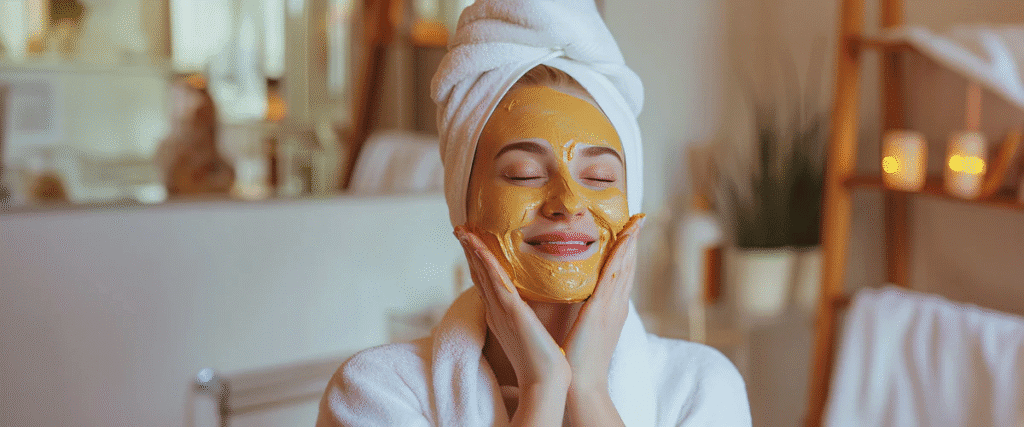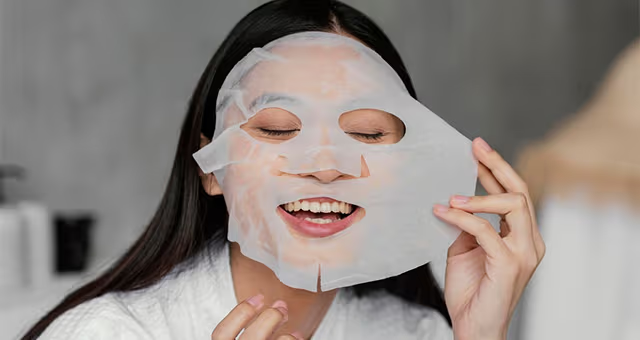Each season introduces new skin issues — dehydration, tanning, dullness, etc. Sure, mixing up your routine may do the trick, but other times your skin requires a little something extra. That’s where face masks save the day. These beauty saviors provide hydration, exfoliation, and intense cleansing when your skin most needs it. Here’s how to select the perfect face mask for radiant complexion — and professional advice on how to use it correctly.

Choosing the Best Face Masks for Radiant Skin
Poring over product labels can be daunting, so we’ve created this cheat sheet to guide you in choosing the best ingredients and formulations for the glow.
Pick the Right Mask Form
Face masks exist in numerous forms. Here’s a brief primer:
Sheet masks: Simple to apply and throw away, full of antioxidants, and excellent for hydrating. For a special relaxing treat, refrigerate them first before application.
Peel-off masks: Provide a deep cleanse and nourish more thoroughly than regular moisturizers. Use, allow to set, and slowly peel away.
Clay masks: Composed of mud, sulfur, or clay — ideal for soaking up excess oils and impurities, and soft exfoliating of the skin.
Read the Ingredients List
Next, know which ingredients suit your skin type. As a rule, always opt for hypoallergenic, paraben-free formulations. Once you’ve narrowed it down, here’s what to look for:
Dry skin: Seek hyaluronic acid — it deeply hydrates and rejuvenates.
Aging skin: Go for Vitamin C — it boosts collagen and protects against sun damage.
Acne-prone skin: Salicylic acid is your friend — it reduces irritation and helps prevent breakouts.
Oily skin: Clay masks are ideal for soaking up oil and leaving skin feeling clean and fresh.
Top Recommended Face Masks for an Instant Glow
Feeling lost in the beauty aisle? We’ve rounded up our top picks for the best face masks for glowing skin in India.

Pond’s Bright Beauty Triple Glow Serum Mask
If you desire radiant skin and fewer dark spots, this one’s for you. It’s a blend of Gluta-Boost-C (60 times more effective than Vitamin C), niacinamide (to reduce pores and soften skin), and Hyaluronic Acid Complex (to lock in moisture for a dewy finish).
Simple Vitamin C Clay Mask
Want to battle impurities and uncover a natural sheen? This clay mask brings together Vitamin C, niacinamide, yuzu lemon, ginger, and 100% bentonite clay to purify pores and brighten your complexion. Glycerine and ginger root juice assist in the elimination of dark spots and dead skin cells without leaving skin dry or dull.
Lakmē Skin Brightening Solutions Sheet Mask with Niacinamide
Pressed for time? This mask delivers one week’s worth of day-and-night skincare in just 15 minutes. With a tri-vitamin complex and 98% pure niacinamide, it brightens and softens your skin — ideal for travel or a quick pick-me-up.
Application Techniques for Optimal Results
You’ve got your mask. Now, here’s how to use it for maximum results:
Step 1: Cleanse Your Face
Always pre-cleanse before using a mask. Pollution, sweat, makeup, and dead skin cells may clog pores — pre-cleansing makes the way clear so your mask can do its job.
Step 2: Apply a Toner
After cleansing, follow with a toner to lightly sweep away the last of impurities. Use a cotton pad to apply it from the middle of your face outwards, including your jawline.
Step 3: Apply Your Face Mask
Now your skin is ready. Follow the instructions on the packaging for how long to leave your mask on.
Step 4: Rinse/Remove and Moisturize
If using a clay or peel-off mask, rinse with lukewarm water. For a sheet mask, simply remove and discard it. Always finish with a lightweight moisturizer to lock in hydration and boost radiance.
Expert Insights: How to Incorporate Face Masks into Your Skincare Routine
Face masks are a strong treatment for particular skin issues. As advised by dermatologist Dr. Julie Fridlington, applying a face mask on a weekly basis can raise your skincare game and make your skin glow even more.
Then again, masks can also cause sensitivity in some individuals — always check labels for possible irritants and perform a patch test beforehand (on your jawline, say) to prevent any negative reactions.
Also Read : DIY Homemade Face Masks for Aging Skin: Rejuvenate at Home!



